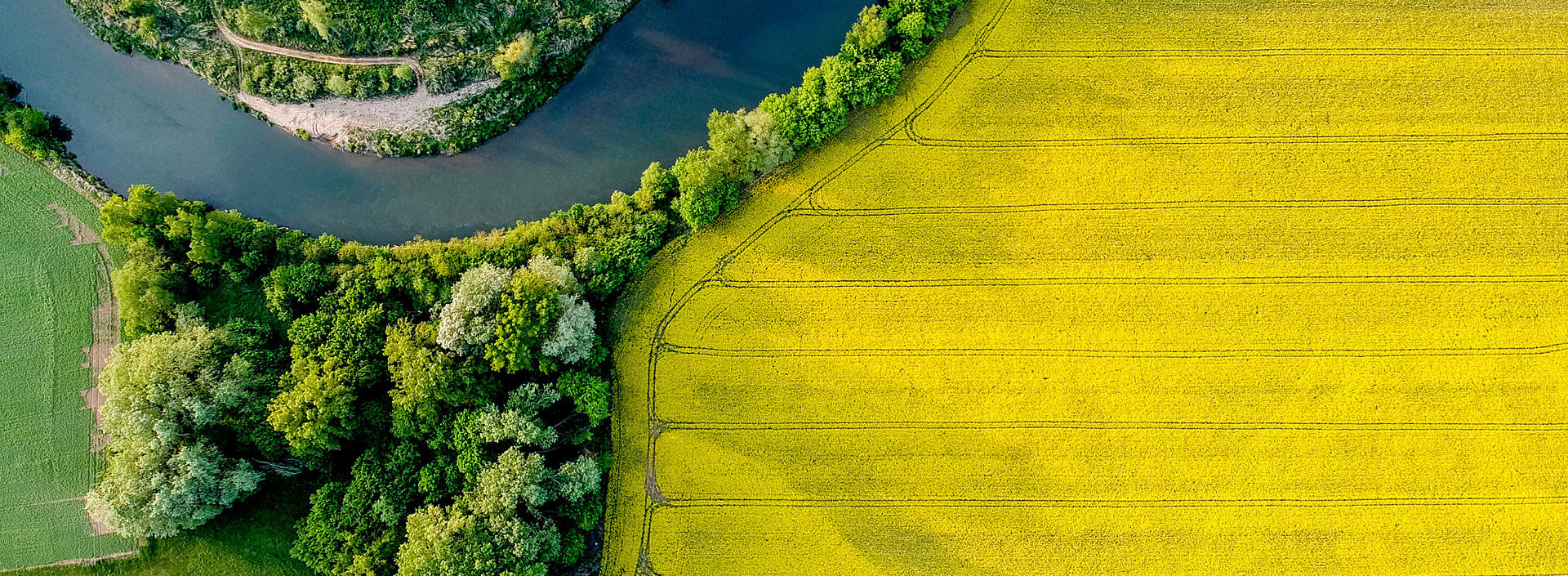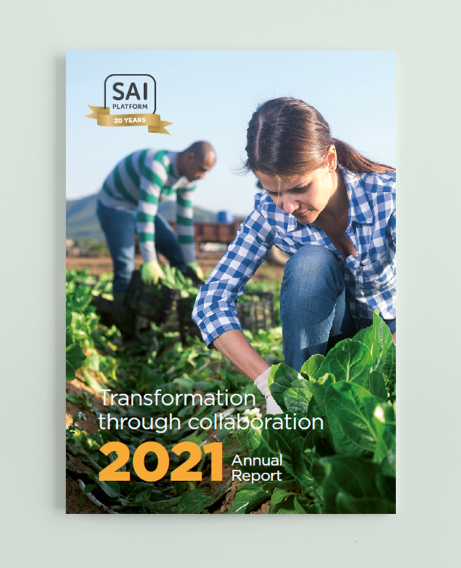Agricultural transformation through collaboration
25th May 2022
A conversation between SAI Platform members

Overview
***This interview is an extract from the SAI Platform Annual Report 2021. To read the full interview, go to the Annual Report 2021.***

The key theme throughout the SAI Platform Annual Report 2021 is agricultural transformation towards a more sustainable food system and the importance of collaboration. With this in mind we got in touch with members from Dairy and Crops Working Groups and the Beef roundtable to discuss what our theme means to them.
Brigid Norde-McAleer, SAI Platform Communications Director, chaired a stimulating conversation between Megan McKerchar of the Crops Working Group, Sarah Haire of the European Roundtable for Beef Sustainability and Haaye Boonstra, whose interests include Crops and Dairy.

Brigid: SAI Platform is celebrating our twentieth anniversary next year. What do you think are the key issues for the food and drink industry and how do you see them developing as we look to the future?
Haaye: I’ve been involved with SAI Platform from the very beginning. I’ve worked in food and drink for almost forty years and in sustainability for 15 of these, for several multinationals in different countries. For the past 4 years I’ve been sustainability manager with Vreugdenhil Dairy Foods which produces milk powders.
I think we can all agree that the number of companies working hard on sustainability has clearly grown and that sustainability has become a key pillar for many companies’ existence. But there’s another side to the story. The situation with climate change getting worse and biodiversity loss, even though we’ve spent billions of dollars to make change happen. We’re focusing on solving the symptoms of the problem, not the source and the way we’ve defined our food and drink system won’t work for the future.
Also, we’re sending mixed messages about sustainability to consumers and ourselves. For example, we need to reduce GHG emissions across the entire supply chain and in agriculture in general, but we don’t have a clear idea of what we’ll use in the future. SAI Platform can play an important role in defining how we make our food system work in a sustainable world.
Sarah: I’m Head of Agriculture for Dawn Meats. I’m an ex-chair of the ERBS and currently chairing the UK Cattle Sustainability Platform. I’m also a farmer, farming cattle, sheep and pigs at home on a very small scale.
I agree with Haaye that we do have to look backwards and recognise the huge progress that has been made. Right now, I’m working more closely with companies that are effectively competitors than I’ve ever done before. That’s a really positive step but it’s also a slow process because it’s harder to make change on a mass scale. We’re only now talking about the supply chain in its entirety. People have only recently joined the dots and the nutrient element is slow to come to the party. We are in danger of losing sight of what we’re producing and its nutritional benefits.
We have all the challenges around processing our raw materials and getting them to the consumer. And, as you say Haaye, the consumer base is more and more aware of sustainability but more and more confused about what to do and what it means. We have the rewilding, organic, and now regenerative agriculture conversations as well as conventional farming. The whole space is getting very noisy. To me, coming together is key and that’s the role SAI Platform plays.
“We’re only now talking about the supply chain in its entirety. People have only recently joined the dots and the nutrient element is slow to come to the party. We are in danger of losing sight of what we’re producing and its nutritional benefits.”
Sarah Haire, Head of Agriculture for Dawn Meats.
Megan: I’m Group Sustainability Manager for Agriculture at Nomad Foods,* the frozen food business. Thank you so much Sarah and Haaye. You’ve really planted some great seeds.
I think sustainability is now a catch-all phrase that means different things to different people. The challenge is that there isn’t a one size fits all solution and we all have different opinions as to what the solutions are. I agree with Sarah that change is slower because we want to make change on a mass level and that takes time.
The good thing is that we’ve started seeing companies demanding more transparency across the supply chain. If our suppliers can’t give us sustainability reports, we ask them for more information. This is happening more and more in food and drink which is great, but we need systematic change to be able to capture all the information we’re asking for. We’re going to have to solve this in the next five years, particularly if we’re going to have good carbon reporting. We’re also going to need ways of capturing quantitative data on a large scale.
To Sarah and Haaye’s point about consumers, recent insights estimates that – speaking only about Western Europe – by 2029 about 50% of consumers will make purchasing decisions based on the demonstrable sustainability of a company. The question is how much of a well-informed and intelligent decision will they be able to make? A lot of greenwashing could potentially happen. I’d say that we need to educate our consumers, but do we have to expect them to be experts? Absolutely not.
Where I see change happening is the need to move away from being purely about trading and more of a partnership. When suppliers are more like long-term partners, we can talk to them about sustainability projects. It’s about improving the sustainability performance of the entire supply chain through better practices and behavioural changes as well as great relationships and collaboration.
*Megan McKercher has since left Nomad Foods and is now Science and Methods Manager at Cool Farm Alliance.
“The commonality I see between us is the need for communication across the supply chain from
due diligence to communicating effectively with our growers and consumers.”
Megan McKercher, formerly Group Sustainability Manager for Agriculture at Nomad Foods.
Brigid: How do you see the food and drink industry’s role in influencing consumer behaviour to enable the positive change we’re all talking about and that of your sector?
Megan: As an industry, I do think we have a role to educate our consumers. And continuing on from the last question, we need good long-term relationships with our suppliers if we’re going to be able to be transparent in how we communicate with consumers. But that’s not as easy as it sounds when you bear in mind that, while we live in a globalised supply chain environment in terms of consumer expectations in other parts of the world are maybe progressing at a slower rate.
If you push businesses too far in your demands for transparency, they might decide they don’t want to supply you anymore and go to your competitors. That’s a risk. The good thing is that consumers clearly want to do the right thing and today’s younger generation are generally better educated about these issues compared to before.
Sarah: Picking up the comment Megan made about consumers not being the experts, she’s so right. It’s got to come down to the fundamentals of: you need to eat to live so what do you do to eat sensibly? All of us in the food and drink industry have a responsibility to help consumers learn how to do this rather than to simply try and persuade them to consume more of our product.
We must also be aware that consumers have greater demands on their pockets and spending on food is smaller than ever. So, we have to cater for everyone, which sometimes goes against sustainability because cheap food is not always sustainable food. We also need to stick to simple messages.
“I think consumers increasingly miss the connection between farmers and food. We need
to build our messages around educating them about the connection between the food they
eat and the people who farm it.”
Haaye Boonstra, Sustainability Manager, Vreugdenhil Dairy Foods.
Haaye: Great points from Meghan and Sarah and I would also say that we need to help educate consumers as to what farming really is. I think consumers increasingly miss the connection between farmers and food. We need to build our messages around educating them about the connection between the food they eat and the people who farm it.
The other thing is marketing. I’ve always said that sustainability and marketing should go hand in hand. The only way to change the mindset of consumers is through marketing and that’s not happening where sustainability is concerned.
Megan: Some interesting things are happening on social media around farming. Farmers, especially younger ones, are starting to put themselves out there and you should see the amount of attention they get on these platforms. This is bringing farming to people who may never have stepped on a farm before and that is new. I think it’s starting to change the perception of farmers to an extent.
Sarah: Can I make a comment? There are some great farmers on social media doing the advocacy piece for us for sure. However, that makes things harder in some cases because the farmers might only be concerned with the world within their farm. Whereas a company like ours is dealing with 20,000 beef and sheep farm suppliers in the UK that are all independent businesses. We always have to look at the bigger picture. But we can only go as far as our supplier base will let us and that’s a key part of the challenge.
Megan: You’re right and it muddies the message as well. It creates more confusion for the consumer.
This interview is an extract from the SAI Platform Annual Report 2021. To read the full interview, go to the Annual Report 2021.